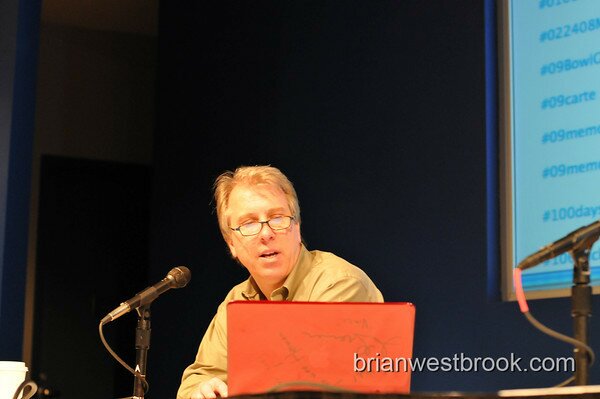 Steve Broback of the Parnassus Group, at 140TC: Seattle. Photo by Brian Westbrook.
Steve Broback of the Parnassus Group, at 140TC: Seattle. Photo by Brian Westbrook.
"It fulfills a prediction I've had since graduating college about the power of hypertext," Twitter co-founder and author Dom Sagolla told me over the phone, about the near-ubiquity of the social media portal he helped conceive. "But it's also humbling, because we designed for such a basic use-case, and it's taken on an incredible range of possibilities. So to see how people have adopted it and used it and made it their own has amazed me."
This was Monday early afternoon, and Sagolla and I were making up for not having been able to connect face-to-face earlier in the day, while I was down at the Bell Harbor Conference Center at Pier 66 for 140: The Twitter Conference, a commerce-meets-culture confab digging into nitty-gritty of how to maximize whatever benefit you're trying to get from your 140-characters-at-a-time online presence.
While the audience was decidedly business-y, and most of the presentations oriented towards marketing and branding opportunities via Twitter, the subjects of politics, pop culture, philanthropy, and privacy kept popping up. On the last subject in that list, Ben Parr of Mashable pretty much summed up the prevailing philosophy when he explained: "Privacy is dead." So there's that.
For my money, the most interesting presentation was by Steve Broback of the Parnassus Group, who is organizing the 140TC conferences around the country. In addition to scoring serious geek cred with his grandmaster Excel skills, Broback provided information on the tools he uses to maximize Twitter, and pretty incredibly, most of them are free (as well as continuing the trend for incredibly stupid names). Basic Twitter search not working for you? Try TwapperKeeper, which lets you create customized, automated searches that create a archived record of Tweets about whatever you're interested in.
Want to know who's been re-Tweeting you? There's BackTweets. Want to know public perception of something via Twitter? Try Twitter Sentiment. Need to figure out who's mentioning you in the global world of microblogging (including Twitter)? Check out Social Mention. Need to figure out who's following you but you're not following? There's Friend or Follow. And finally, do you want a customizable word-cloud of associations with the topics you're following? Try Cloud.li.
"Privacy is dead," indeed. Welcome to brave new world of easily collected and digested consumer research, provided for free by the public.
Not that 140TC was exclusively given over to marketing concerns. The good people behind Vittana (see our interview with the founders here) were on-hand making a pitch for March Microfinance Madness. Vittana is a Seattle-based education-oriented microfinance organization, which allows lenders to provide only a few hundred dollars that can be crucial to the education of someone in the developing world. Microfinance may be one of the most over-hyped ideas in the realm of economic development these days, but it does have very real impacts on the lives of real people, and Vittana is a fantastic way to help.
In fact, altruism and social change were on pretty much everyone's tongues at the conference, though personally it smacked a little of your standard tech utopianism. Still, things like the "Million-Dollar Tweet," the result of Wyclef Jean's Tweet request donations for Yéle Haiti following the earthquake there, show the power of social networking technology to get people to act.
One of the things that most interested me going in was the subject of celebrities on Twitter. Much hay's been made about people like Jean, or Ashton Kutcher or Conan O'Brien, who sport one-million Twitter followers each. On the one hand, it seems like a more direct connection to their fans and audiences, but give it a moment of thought and that argument makes no sense. After all, these celebrities already have media access to even larger groups of people, and quite notoriously, their Twitter relationships are very one-way: just look at the brouhaha over Conan finally following another Twitter user, Sarah Killen, an average 19-year-old from Michigan.
"It's not an actual connection, it's the illusion of intimacy," Sagolla told me over the phone, and went on further to point out that the level of connectedness through a social media portal like Twitter is not dependent on the technology but rather the user, and the degree to which he or she chooses to engage.
"Ashton's a wonderful example," Sagolla told me. "He started out with an already very large following--fans from his movies and TV show--and started being very playful. And then when he started to reach a certain level, when he was competing with CNN to reach a million, it started to take a much more socially responsible or serious tone.
"When I saw that, I really felt like there seems to be the promise of social networks in general and Twitter specifically, that it has built into it in some way, either by design, an altruistic or, I guess I could call it, compassionate community. There's some sense that because Ashton and Conan have this direct relationship with their fans, there's a sense that they have to give back."
 Subscribe to our Front Page Stories
Subscribe to our Front Page Stories
![]() Subscribe to all SunBreak Stories
Subscribe to all SunBreak Stories
Most Recent Comments